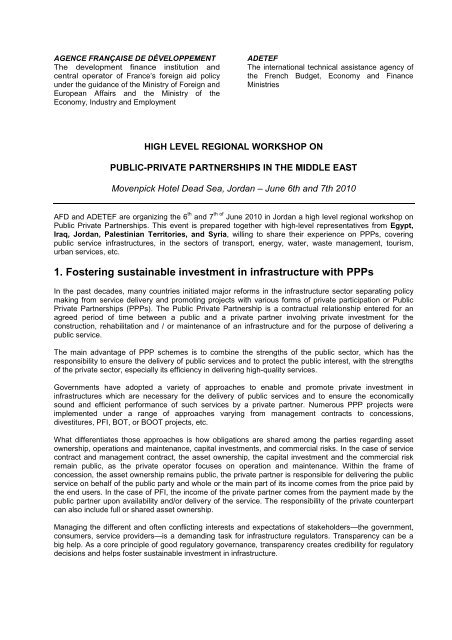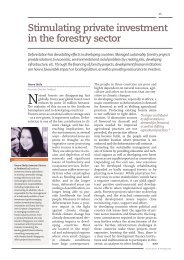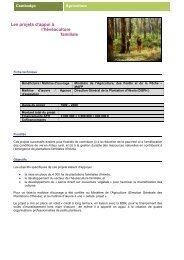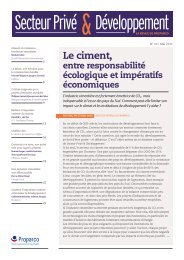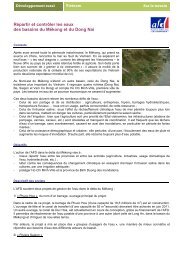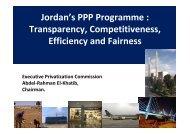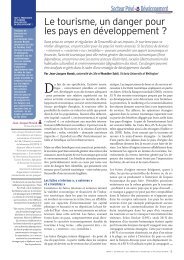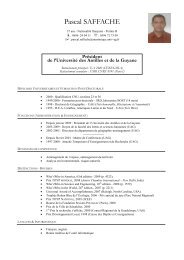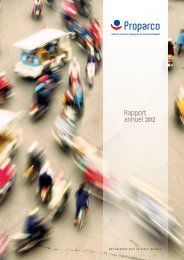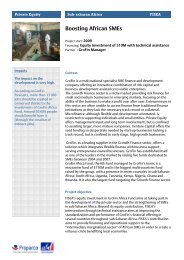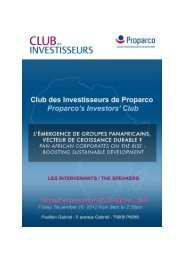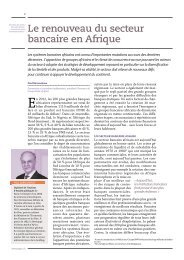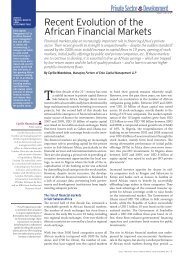Concept note - Agence Française de Développement
Concept note - Agence Française de Développement
Concept note - Agence Française de Développement
Create successful ePaper yourself
Turn your PDF publications into a flip-book with our unique Google optimized e-Paper software.
AGENCE FRANÇAISE DE DÉVELOPPEMENT<br />
The <strong>de</strong>velopment finance institution and<br />
central operator of France’s foreign aid policy<br />
un<strong>de</strong>r the guidance of the Ministry of Foreign and<br />
European Affairs and the Ministry of the<br />
Economy, Industry and Employment<br />
ADETEF<br />
The international technical assistance agency of<br />
the French Budget, Economy and Finance<br />
Ministries<br />
HIGH LEVEL REGIONAL WORKSHOP ON<br />
PUBLIC-PRIVATE PARTNERSHIPS IN THE MIDDLE EAST<br />
Movenpick Hotel Dead Sea, Jordan – June 6th and 7th 2010<br />
AFD and ADETEF are organizing the 6 th and 7 th of June 2010 in Jordan a high level regional workshop on<br />
Public Private Partnerships. This event is prepared together with high-level representatives from Egypt,<br />
Iraq, Jordan, Palestinian Territories, and Syria, willing to share their experience on PPPs, covering<br />
public service infrastructures, in the sectors of transport, energy, water, waste management, tourism,<br />
urban services, etc.<br />
1. Fostering sustainable investment in infrastructure with PPPs<br />
In the past <strong>de</strong>ca<strong>de</strong>s, many countries initiated major reforms in the infrastructure sector separating policy<br />
making from service <strong>de</strong>livery and promoting projects with various forms of private participation or Public<br />
Private Partnerships (PPPs). The Public Private Partnership is a contractual relationship entered for an<br />
agreed period of time between a public and a private partner involving private investment for the<br />
construction, rehabilitation and / or maintenance of an infrastructure and for the purpose of <strong>de</strong>livering a<br />
public service.<br />
The main advantage of PPP schemes is to combine the strengths of the public sector, which has the<br />
responsibility to ensure the <strong>de</strong>livery of public services and to protect the public interest, with the strengths<br />
of the private sector, especially its efficiency in <strong>de</strong>livering high-quality services.<br />
Governments have adopted a variety of approaches to enable and promote private investment in<br />
infrastructures which are necessary for the <strong>de</strong>livery of public services and to ensure the economically<br />
sound and efficient performance of such services by a private partner. Numerous PPP projects were<br />
implemented un<strong>de</strong>r a range of approaches varying from management contracts to concessions,<br />
divestitures, PFI, BOT, or BOOT projects, etc.<br />
What differentiates those approaches is how obligations are shared among the parties regarding asset<br />
ownership, operations and maintenance, capital investments, and commercial risks. In the case of service<br />
contract and management contract, the asset ownership, the capital investment and the commercial risk<br />
remain public, as the private operator focuses on operation and maintenance. Within the frame of<br />
concession, the asset ownership remains public, the private partner is responsible for <strong>de</strong>livering the public<br />
service on behalf of the public party and whole or the main part of its income comes from the price paid by<br />
the end users. In the case of PFI, the income of the private partner comes from the payment ma<strong>de</strong> by the<br />
public partner upon availability and/or <strong>de</strong>livery of the service. The responsibility of the private counterpart<br />
can also inclu<strong>de</strong> full or shared asset ownership.<br />
Managing the different and often conflicting interests and expectations of stakehol<strong>de</strong>rs—the government,<br />
consumers, service provi<strong>de</strong>rs—is a <strong>de</strong>manding task for infrastructure regulators. Transparency can be a<br />
big help. As a core principle of good regulatory governance, transparency creates credibility for regulatory<br />
<strong>de</strong>cisions and helps foster sustainable investment in infrastructure.
2. Sharing lessons from recent operations in the Middle East<br />
New financing mo<strong>de</strong>ls for infrastructure such as sustainable transport, water supply, health and education<br />
have emerged during the global economic crisis. Governments have faced higher borrowing costs, lower<br />
levels of credit, and reduced international capital flows as a result of the crisis, making it urgent to find<br />
innovative ways to combine public and private financing to meet the mounting <strong>de</strong>mand for infrastructure.<br />
Projects need greater support and risk-bearing from governments. How can governments best <strong>de</strong>sign their<br />
programs to bring in financing while also providing value-for-money, how to mobilize private investments,<br />
what mechanisms can governments implement to support PPPs in terms of risk-bearing, guarantees, good<br />
governance and transparency<br />
With a greater focus on sustainable <strong>de</strong>velopment, the need to curb rising levels of greenhouse gases and<br />
to help countries in adapting to the anticipated impacts of climate change will also require substantial<br />
investments in infrastructure. How can we meet these needs, how can we mobilize financing from both the<br />
public and the private sectors, at the domestic and international levels<br />
The impact on the <strong>de</strong>livery of infrastructure services, and whether there are negative consequences for<br />
other important social goals, such as equity, should be consi<strong>de</strong>red in PPPs. Despite consi<strong>de</strong>rable<br />
progress, private participation or Public Private Partnership arrangements still face several implementation<br />
challenges. These challenges typically involve tariff setting and adjustment, regulatory in<strong>de</strong>pen<strong>de</strong>nce or<br />
dispute over contractual provision. How can policymakers and regulators best improve regulatory<br />
transparency<br />
The competition is tough between neighbouring countries to attract financing and the involvement of<br />
private operators, in a situation where regulations and laws vary from a country to another. How to<br />
harmonize preparations of infrastructure projects, how to strengthen the coordination between PPP units,<br />
how to enhance the legal and regulatory frameworks for project financing<br />
3. Taking benefit of a centuries-old experience of PPPs in France<br />
Historically, concessions and other PPP approaches have been tested in France since the 18 th<br />
century for transportation infrastructures or water management. This experience increased during<br />
the 19 th century with urban infrastructures notably in Paris un<strong>de</strong>r Baron Haussmann restructuration<br />
works.<br />
Numerous approaches are <strong>de</strong>veloped in France, involving different levels of public authorities, state,<br />
regions, districts, or municipalities, such as “concessions”, “global public contracts”, “convention for<br />
public domain utilization”, “national interest operation”, “partnership contracts”.<br />
Furthermore, French private and public operators have been transferring this know how,<br />
collaborating with foreign counterparts in different sectors ranging from water management,<br />
transportation infrastructures, waste management, energy production and distribution schemes, etc.<br />
AFD is the Groupe <strong>Agence</strong> Française <strong>de</strong> Développement, a bilateral financial and <strong>de</strong>velopment<br />
institution working on behalf of the French Government. As a bilateral <strong>de</strong>velopment bank and as the<br />
central operator of France’s foreign aid policy un<strong>de</strong>r the guidance of the Ministry of Foreign Affairs and the<br />
Ministry of Economy, AFD uses a wi<strong>de</strong> range of financial instruments such as grants, subsidies,<br />
guarantees, loans, equity, shareholding, co-financing and local bank intermediation.<br />
The Agency works with many partners: national, regional and local governments; local authorities and<br />
municipalities; international agencies; non-governmental organizations; foundations; private companies;<br />
entrepreneurs; and local banks, microfinance institutions and capital markets. AFD’s financing, know-how<br />
and more than a thousand employees and agents support social, economic and environmental projects in<br />
many sectors, including those where PPPs are engaged in, such as urban infrastructure, transportation,<br />
energy, water management, …<br />
ADETEF, the international technical assistance agency of the French Ministries of Economy and Finance,<br />
is providing governments and public authorities with high-level expertise from the public sector and<br />
contributes to disseminate best practices in the areas of economic and financial policy-making.
On PPP items, the objective of A<strong>de</strong>tef policy is to increase awareness of his partners countries about the<br />
different public-private partnership contracts and to promote the long French experience of the public<br />
sector with the private operators.<br />
The agency is <strong>de</strong>veloping this activity through several services such as bilateral actions (seminars and<br />
study visits), training and information weeks in France, benchmarking operations, involvements on<br />
multilateral funds in calls for ten<strong>de</strong>rs from the European Union or other international financial institutions<br />
(IFIs). The main topics are <strong>de</strong>veloped with experts from all the institutional partners of A<strong>de</strong>tef: the French<br />
PPP task force (Mappp), the French line ministries of transports, ecology, public works, health, justice,<br />
education, interior…, PPP experts from a lot of private fields (lawyers, banking institutions…) and private<br />
companies.<br />
4. Objectives and structure of the Workshop<br />
The Workshop will provi<strong>de</strong> an exchange platform for the key issues of public-private partnership schemes,<br />
and will enable real experience sharing with <strong>de</strong>cision makers, financing institutions, private operators and<br />
experts with, as main objective, to find innovative ways to combine public and private financing to meet the<br />
mounting <strong>de</strong>mand for infrastructure in the Middle East.<br />
The major subjects and issues to be discussed cover:<br />
• Learning from projects implemented in Egypt, Iraq, Jordan, Palestinian Territories and Syria<br />
• Laws and regulations in the different countries<br />
• Difficulties and constraints in contracting and following up<br />
• Strong points and methodologies for profitability, risk management, social requirements<br />
• Tariffs and regulatory function of the public counterparts<br />
• Monitoring the risks and managing the financing in good conditions<br />
The Workshop is organized in 6 sessions, each of them lasting 1:30 hour.<br />
1. Lessons from recent and/or major PPP projects implemented in the Middle East<br />
2. Statement of the institutional and legal reforms framing PPPs in this region<br />
3. Evaluation of the main difficulties and constraints to take up<br />
4. Methods of management, risk monitoring, and financing<br />
5. An experience of private operators in France: concession and tariff scaling<br />
6. Tools and methodologies proposed by French public institutions in emerging or <strong>de</strong>veloping countries<br />
Expected speakers will inclu<strong>de</strong>:<br />
Public <strong>de</strong>cision makers, representatives of ministries, heads of PPP units, regulatory authorities<br />
Representatives of financial institutions, AFD, the World Bank, private banking<br />
ADETEF, Lawyers, experts<br />
Major private groups operating in the region<br />
Targeted audience:<br />
Public authorities in charge of projects planning and financing<br />
Public authorities in charge of contacting and monitoring<br />
Private operators in the fields of infrastructure, transportation, energy, water<br />
Consultancy services, engineering companies, Lawyers<br />
Professional and Customers Organizations


